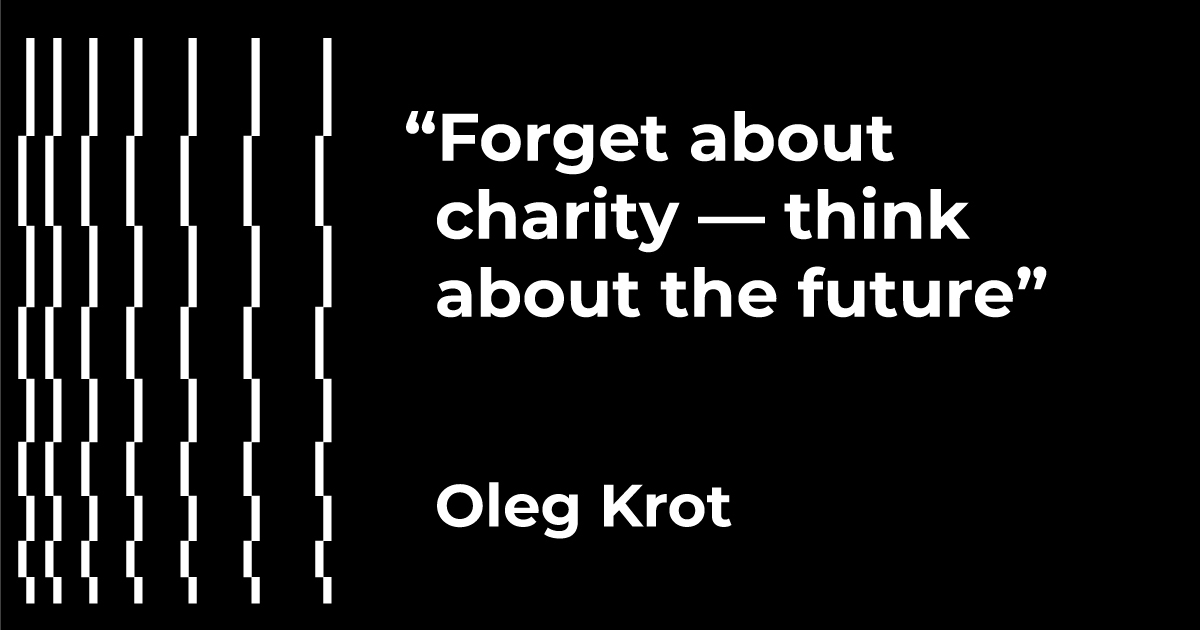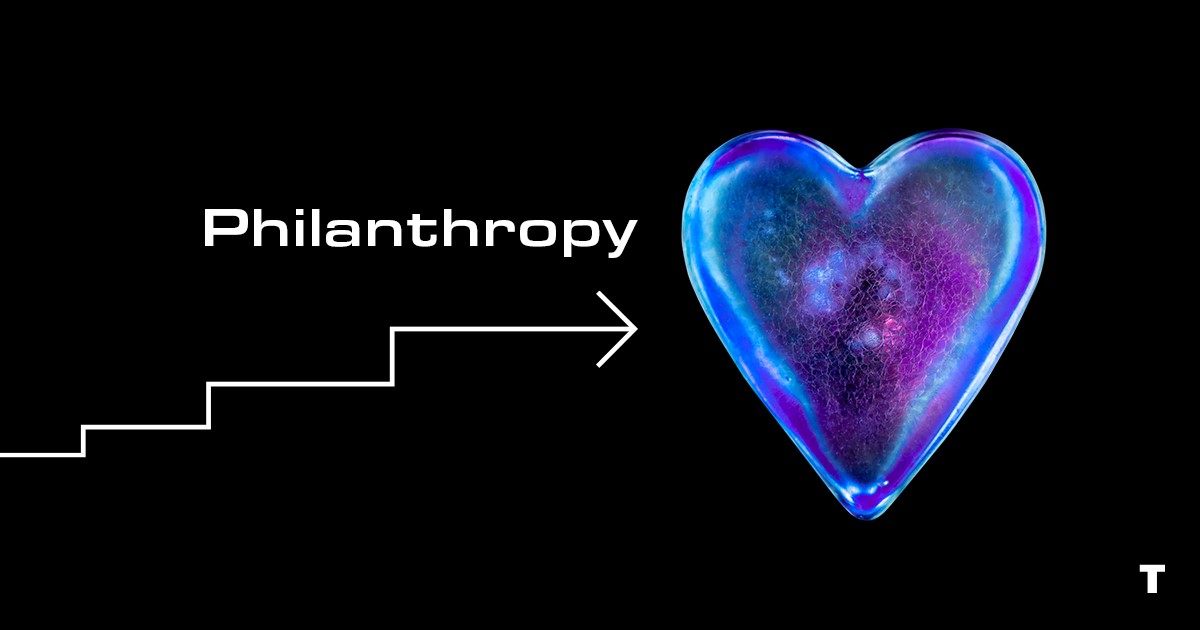 The world has experienced a real boom in philanthropy last year. Most philanthropists , and a quarter of donors said they are ready to donate more due to the pandemic. But the structure of philanthropy has changed beyond recognition, all funds were spent on the fight against coronavirus, and arts and education were left with virtually no subsidies.
The world has experienced a real boom in philanthropy last year. Most philanthropists , and a quarter of donors said they are ready to donate more due to the pandemic. But the structure of philanthropy has changed beyond recognition, all funds were spent on the fight against coronavirus, and arts and education were left with virtually no subsidies.
What charitable projects should you consider? Should you be thinking of philanthropy at all while businesses go down, unable to withstand the consequences of a lockdown?
You definitely should. Charity is always of current concern and is the same element of entrepreneurship as team bonding, production, marketing. With a mindless approach, it can turn into a minefield for the company. Let's try to figure out how to put gratuitous help on an effective track.
In-your-face PR
In the most common version, the charity is used as a PR tool. The logic behind it is quite simple: when the company donates money to socially significant projects, the level of customer loyalty grows.
But some do not resist the temptation to squeeze the maximum out of it. In 1999, on social programs. And after that, another $100 million for social advertising, telling about how the company is changing the lives of ordinary Americans for the better. Philip Morris' profits soared sharply, but the strategy provoked a storm of criticism and accusations of cynicism on a particularly large scale.
In 2020, such a move could have ended up badly for the company. Such an in-your-face PR in regards to charity is under a microscope by the society that is looking for attempts to appease people and increase capital. Which, in general, is fairly true. Yes, one should follow business goals, but no one likes manipulations (and, by the way, even the employees of such companies).
Visionary approach. Globally
There is another concept of charity. The main point of which is that the company solves important social problems.
If society benefits from these initiatives, then business also benefits.
This approach is called strategic philanthropy. It affects the business indirectly, but significantly. The target audience of such projects is the community living in the area where the business operates. Today in the United States there are not a lot of companies that will invest in charity projects that are being implemented outside of their areas of business interests.
Global companies can implement larger projects. For example, Michael Bloomberg's charitable foundation (now on the Forbes 400 list with a $55 billion result) donated $500 million to the , which calls for the closure of all US coal-fired power plants and, accordingly, radically cleaning the atmosphere of their harmful emissions. Thanks to donations from Bloomberg Philanthropies, 318 out of 530 businesses have been eliminated to date. The rest will be closed until 2030.
Bloomberg trims his sails to the wind, cleverly addressing public expectations. The environmental agenda is one of the most urgent.
Nielsen statistics that 81% of earthlings are convinced that companies should contribute to a better environment. So Bloomberg is investing in a program that they estimate will save thousands of lives.
The main thing of this approach is the awareness of the fact that business does not exist in a vacuum. It is always integrated into the ecosystem, the key element of which is society. Business is created for people, and the future of the company depends on how the relationship with them will be built.

Photo: Managing Partner
Visionary approach. Locally
Strategic philanthropy works equally well across the planet, country, city, or region. The main thing is to focus on tomorrow.
For example, a company may support local medical and/or educational institutions. After all, people's need for health and intellectual development will always be in demand.
For example, if you help a regional university with a technical base or an up-to-date educational program, such an initiative will affect the level of training of local personnel. Donating to a university is less costly than creating your own one.
This is one of the solutions to the problem of personnel qualification in the future. Many people are talking about the need to improve STEM education, for example. But in reality, this is done only by those who look years and decades ahead.
Businessmen are not doctors, but they can save lives by helping specific doctors and hospitals. One of the companies of our holding was building a data center in Kropyvnytskyi. We learned that a talented neurosurgeon, an immigrant from Luhansk, is working at the local children's hospital. He performed the most complex brain surgeries, but he had to work on old Soviet devices.
Our business supported the clinic and after a complete renovation, Kropyvnitsky's pediatric neurosurgery started working at the level of the ones in Kyiv and even abroad. This is just one case of how you can influence health care in the city.
2020 highlighted the role of strategic philanthropy on the ground in particular. Hundreds of millions of hryvnias of Ukrainian companies are the purchase of ventilators and diagnostics, oxygen, protective equipment, test systems, and the development of vaccines. One might argue that it’s for PR purposes. But in fact, this is just common sense, after all, what kind of business is it without active and healthy employees and customers?

Do you need to invest in charity at all?
“Corporations do not have to solve the problem of social welfare. The business of business is making money, not sweet music,” said Theodore Levitt, a professor at Harvard Business School.
The ones who perform business in practice would disagree with him. Over the past decade, the combined fortune of the Forbes 400 (the list of the richest Americans) has grown from $1.3 trillion to $ 3trillion, and most of that money is to go to charities.
Despite Levitt's opinion, philanthropy is becoming the rule. In many companies, this is no longer a separate activity, but part of the corporate social responsibility policy, according to which, the business should not only pay taxes but also share responsibility with society for a whole range of issues, from the social and economic adaptation of the most vulnerable to solving environmental problems.
Today, adhere to the CSR policy. This action in the business environment has become a good manner. If you want to be part of the global business community, these values are needed to be integrated into internal standards.
It doesn't work in any other way, I must say. Let's say your Ukrainian company is about to sign a deal with an international one. Today it is impossible to do this without meeting the business standards accepted in the Western environment.
Consistency above all
Let’s sum it up. Philanthropy has become an indispensable part of the business. This means that it has already become the standard. Yes, you can spend money mindlessly for the sake of trying to promote and strengthen your business reputation. But this is not enough.
Look at the charity as a project with a long-term perspective, not for a day or two, but for years to come. In this case, solving urgent problems of the region in which the company operates is the right strategy.
In 2016, California-based clothing manufacturer Patagonia pledged to donate all of its Black Friday sale revenues to local environmental organizations. The sales department was counting on $2 million only, but state residents supported the initiative. As a result, Patagonia and gained an army of loyal customers.
Usually, people object that this story is irrelevant for our country, people will not appreciate such a thing. Well, that's what they usually say about lots of strong entrepreneurial ideas. Forget about skeptics. For starters, forget about the charity itself. Think about the future.
Original article on


